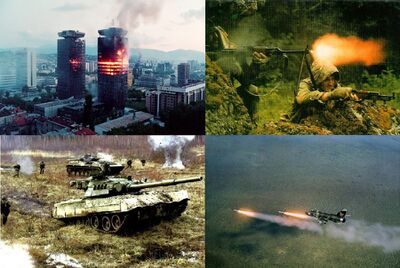Jedorian Civil War
This article is incomplete because it is pending further input from participants, or it is a work-in-progress by one author. Please comment on this article's talk page to share your input, comments and questions. Note: To contribute to this article, you may need to seek help from the author(s) of this page. |
| Jedorian Civil War | |||||||
|---|---|---|---|---|---|---|---|
 Clockwise from top left: Dranga burns during the Siege of Dranga, Combine rebels fighting during the 2006 Tikinov Offensive, the Jedorian People's Army attacks during Operation Oracle, Jedorian Revolutionary Air Force strike aircraft attacks rebel positions. | |||||||
| |||||||
| Belligerents | |||||||
|
File:CombineLogo.png Combine Rebels Able Vigil Accords |
| ||||||
| Commanders and leaders | |||||||
|
Consul Kazys Ulinskas Field Marshal Aris Jēkabsons |
Premier Sandars Blekte Marshal Edgars Zvinelis Colonel General Arnotijs Mekšs | ||||||
| Strength | |||||||
| 2.7 million (Peak) | 2.3 million (Peak) | ||||||
| Casualties and losses | |||||||
|
731,500 killed 2.1 million wounded |
638,000 killed 1.7 million wounded | ||||||
The Jedorian Civil War was a war fought within the Socialist Republic of Jedoria against the Combine Rebels between 2004 and 2008. Sparked by The Uprising, the conflict saw the mass rebellion of several southern states against the Socialist government, driven by years of economic decline and the erosion of civil liberties within the country after decades of Socialist rule. After controversial elections failed to bring about political change and harsh government crackdowns against dissenters, protesters and political opponents of the Socialist Republic banded together to form the Combine, a political front that saw to establish democratic rule of law in Jedoria, and the abolishment of socialism. When news of this reached the Central Committee, forces of the Jedorian People's Army were dispatched to suppress the revolt, which was centered in the state of Tukayyid.
Rather than suppress the Combine however, the equivalent of 17 divisions of troops defected from the JPA to join with the Combine. This series of events came to be known as the Uprising, as the sudden departure of so many of the JPA's best forces severely crippled the organization as whole, preventing the Socialists from quickly stamping out the revolt. The Combine would go on to declare itself the legitimate government of Jedoria, decrying the Socialist Government's authoritarian nature while appealing to the international community for support. Due to the mass defection and general shock of the Uprising, the Socialist Republic was noticeably slow to react, allowing the Combine rebels to build up their forces and prepare for a full scale conflict with the Socialists.
In Spring of 2005 the Socialists invaded southern Jedoria to reassert Socialist control, but fighting bogged down and descended into attritional warfare, marked by frequent large scale offensives by both sides. By 2006 however the Socialists had lost control of Arstotzka, the only southern state that remained loyal to the Socialist Republic, and subsequent efforts to regain the initiative failed. By late 2007 the rebels, backed up by foreign support and supplies, forced the Socialists out of southern Jedoria, crossed the Luminovian Canal and drove into the heart of Socialist power in Bessarabia. Socialist forces surrendered in May of 2008, marking the end of the civil war and leading to the establishment of the Federated Combine.